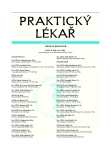Breast cancer in older women
Authors:
T. Büchler; J. Hornová; D. Kordíková; Z. Donátová; P. Kubánková; E. Voršilková; M. Foldyna; J. Abrahámová
Authors‘ workplace:
Primářka: prof. MUDr. Jitka Abrahámová, DrSc.
; Univerzity Karlovy, Praha
; Onkologické oddělení
; Fakultní Thomayerova nemocnice a 1. lékařská fakulta
Published in:
Prakt. Lék. 2010; 90(1): 40-42
Category:
Of different specialties
Asi 20 % pacientek s karcinomem prsu je diagnostikováno ve věku 75 let a více a procento pacientek diagnostikovaných po 80. roce života v posledních 30 letech mírně narůstá. V naší studii jsme analyzovali vzorek 99 pacientek s karcinomem prsu diagnostikovaným po 75. roce života. Naše výsledky poukazují na velmi vysoký podíl starších pacientek s lokálně pokročilým karcinomem prsu již v době diagnózy. Relativně šetrná, neradikální onkologická terapie může v těchto případech vést k relativně dlouhému přežití a nízké specifické mortalitě.
Overview
Approximately 20 % of breast cancer patients are diagnosed at the age of 75 years or over. The percentage of patients diagnosed over the age of 80 has been increasing over the past 30 years. We analysed a cohort of 99 women aged 75 years or older when diagnosed with breast carcinoma. Locally advanced breast cancer (T4) was encountered much more frequently in this population when compared with younger patients. Relatively conservative antineoplastic therapy often leads to long-term survival and low specific mortality in this age group. At the moment, mammographic screening is not funded for women over 69 years of age in the Czech Republic. In addition, a lack of awareness of the early symptoms of breast cancer and an unwillingness to seek medical help should these symptoms appear, results in a high proportion of breast cancers in the elderly population being diagnosed in advanced stages, causing significant morbidity and impaired quality of life.
Key words:
breast cancer, chemotherapy, hormonal therapy, radiotherapy
Sources
1. Abrahámová, J., Povýšil, C., Horák, J. a kol. Atlas nádorů prsu. Praha: Grada Publishing 2000.
2. Dušek, L., Mužík, J., Kubásek, M. a kol. Epidemiologie zhoubných nádorů v České republice [online]. Brno: Masarykova univerzita, 2005. Dostupný z WWW: http://www.svod.cz. Verze 7.0 [2007], ISSN 1802–8861. [cit. 2009-11-12].
3. Abrahámová, J., Dušek, L. a kol. Možnosti časného záchytu rakoviny prsu. Praha: Grada Publishing 2003.
4. Wildiers, H., Kunkler, I., Biganzoli, L. et al. International Society of Geriatric Oncology. Management of breast cancer in elderly individuals: recommendations of the International Society of Geriatric Oncology. Lancet Oncol. 2007, 8, p. 1101-1115.
5. Carlson, R.W., Moench, S., Hurria, A. et al. NCCN Task Force Report: breast cancer in the older woman. J. Natl. Compr. Canc. Netw. 2008, 6 Suppl 4, p. S1-S25.
6. Eaker, S., Dickman, P.W., Bergkvist, L. et al. Uppsala/Orebro Breast Cancer Group. Differences in management of older women influence breast cancer survival: results from a population-based database in Sweden. PLoS Med. 2006, 3, e25.
7. Woods, L.M., Rachet, B., Lambert, P.C. et al. ‘Cure’ from breast cancer among two populations of women followed for 23 years after diagnosis. Ann. Oncol. 2009, 20, p. 1331-1336.
Labels
Paediatric clinical oncology Clinical oncology General practitioner for children and adolescents General practitioner for adultsArticle was published in
General Practitioner

2010 Issue 1
- Advances in the Treatment of Myasthenia Gravis on the Horizon
- Hope Awakens with Early Diagnosis of Parkinson's Disease Based on Skin Odor
- Memantine in Dementia Therapy – Current Findings and Possible Future Applications
- Memantine Eases Daily Life for Patients and Caregivers
- Possibilities of Using Metamizole in the Treatment of Acute Primary Headaches
-
All articles in this issue
-
Evolution and evolutionary theory for physicians.
I. Fact. Theory. Method. - Practical application of bright light therapy
- Excessive consumption of meat in aetiology of colorectal cancer
- Mallet finger
- Analysis of the BARI 2D study – Revascularization and the use of anti-diabetic drugs in patients with Type 2 diabetes and coronary heart disease
- Breast cancer in older women
- Food craving: Food-Craving Questionnaire – Trait
- Bacterial contamination of cigarettes
- Indebtedness people with addictive illnesses are health and social problem
-
Evolution and evolutionary theory for physicians.
- General Practitioner
- Journal archive
- Current issue
- About the journal
Most read in this issue
- Mallet finger
- Food craving: Food-Craving Questionnaire – Trait
- Practical application of bright light therapy
- Breast cancer in older women
